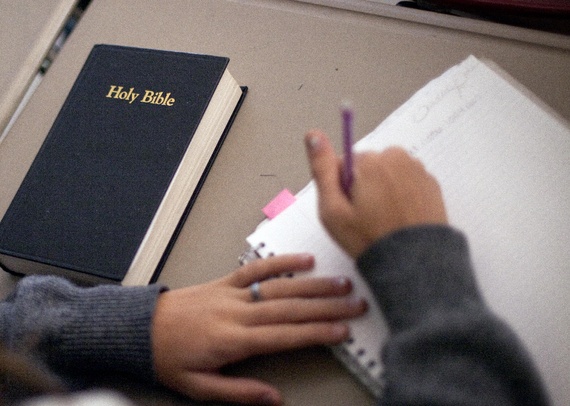The battle of separation of church and state has been raging for decades. Lawyers today, struggle with the idea that students and especially teachers, can bring their Bibles into school. But today, students across America are bringing their Bibles to school.
It is a part of a national movement that has been happening for decades. Earlier in the week, students also prayed at their flag poles. I was part of this movement when I was in high school, from 2004-2008. It was very helpful for students who wanted to express their faith openly and pray for their friends.
According to Fox News, Jeremy Dys, special counsel for litigation and communications for First Liberty Institute, told Fox News:
“Students are not only allowed to bring their Bible to school. They’re certainly allowed to read it during free time, in between classes, and even reference the Bible within their assignments and class discussions.”
To my surprise, the opposition agreed. Elizabeth Cavel, associate counsel for Freedom From Religion Foundation, also provided her thoughts to Fox News:
“The constitutional boundaries are simple; students of course have the right to bring their Bible to school on this day or any day.”
However, Cavel also warned:
“Public school teachers and administrators may not promote or encourage students to participate in religious events on this day or any other day.
Its good that both sides agree that students and teachers can bring their Bibles to school. However, the legality of promoting the Bible in school needs to be addressed. America’s founding fathers absolutely encouraged the Bible to be taught in schools across America.
What did the Founding Fathers think?
Noah Webster, the Father of American Education and author of Webster’s Dictionary of 1828, had this to say about the Bible in schools:
“In my view, the Christian religion is the most important and one of the first things in which all children, under a free government ought to be instructed.”
In addition to Webster’s quote, he also defined the word Education as:
“EDUCATION, n. The bringing up, as of a child; instruction; formation of manners. Education comprehends all that series of instruction and discipline which is intended to enlighten the understanding, correct the temper, and form the manners and habits of youth, and fit them for usefulness in their future stations. To give children a good education in manners, arts and science, is important; to give them a religious education is indispensable; and an immense responsibility rests on parents and guardians who neglect these duties.” [Emphasis added]
Fischer Ames who is considered the author of the First Amendment supported the Bible in public education.
“[Why] should not the Bible regain the place it once held as a schoolbook? Its morals are pure, its examples captivating and noble. The reverence for the Sacred Book that is thus early impressed lasts long; and probably if not impressed in infancy, never takes firm hold of the mind.”
Ames also said this:
“We have a dangerous trend beginning to take place in our education. We’re starting to put more and more textbooks into our schools. … We’ve become accustomed of late to putting little books in the hands of children containing fables with moral lessons. We are spending less time in the classroom on the Bible, which should be the principle text in our schools. The Bible states these great moral lessons better than any other manmade book.”
Benjamin Rush, Signer of the Declaration of Independence, and physician also defended the Bible in schools.
“If we were to remove the Bible from public schools, we would be wasting so much time punishing crimes and taking so little pains to prevent them.”
Logical conclusion
There are many other quotes from many notable leaders of our nation but I chose these quotes because the oft-used argument is that our founding fathers were not Christian men. That they intended the Constitution to prohibit an establishment of religion in America.
Those who argue that are only partially correct. The First Amendment does prohibit an establishment of a national religion, but it does not prohibit states. They also argue that the First Amendment prohibits anything religious from being promoted in the public square.
Clearly our founders did not believe that, otherwise, they would not have supported the Bible being used as the primary textbook in schools. The Bible was used as a primary textbook until the early 1930s, under President FDR.
Benjamin Rush’s quote is important to consider. He, along with many folks back then, understood that the Bible provided the best foundation for education, morality, and purpose. If the Bible is taught to educate our youth, the principles that establish their life will prevent them from doing wrong, and as a result, prevents crime.
Fischer Ames is very critical. Because he was the author of the First Amendment. The very amendment which “scholars” today claim prohibits freedom of religion and anything Christian related. Why would the author of the First Amendment write an amendment that opposes the very core beliefs in his heart? Additionally, why would the other signers of the Constitution agree to that, considering they believed the same as Ames?
You may disagree with the Bible being taught in school. And you may not like Christianity. But it is intellectually dishonest to deny that the Bible is the foundation of liberty, education, and civil society.
